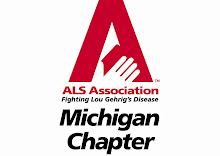

Research Update from The ALS Association’s National Office
May 27, 2010
ALS Biomarkers Clinical Research Study Call for Participants
Researchers are looking for 250 people to participate in an ALS biomarker study. Anyone interested in participating should select from the list below and contact the closest medicalcenter. Participants must be at least 30 years of age, be willing to have blood and cerebrospinal fluid (CSF) drawn for the study, and participate in follow up phone calls and visits approximately every 6 months.
The ALS Association has funded several studies to support efforts to identify biomarkers: in particular, a collaboration between investigators at University of Pittsburgh, Massachusetts General Hospital and Metabolon (a diagnostic products and services company) to identify signatures for the disease. Initial studies identified potential markers. Most of these biomarkers have been discovered in the CSF. It is crucial to repeat these findings in a much larger number of samples to better evaluate the ability of the biomarkers to accurately predict ALS. We must
also determine if these biomarkers can not only be recognized in the CSF but also detected in the blood. It is anticipated that some of these biomarkers may also help predict treatment outcome.
Continued funding through The Association and more recently the National Institutes of Health (NIH) is enabling the collection of CSF and blood from 250 individuals with ALS, suspected of having ALS or another motor neuron disease, and healthy individuals. Dr. Robert Bowser from the University of Pittsburgh and Dr. Merit Cudkowicz from Massachusetts General Hospital are the leaders of this investigation. The grant application for this study won one of the prestigious NIH Challenge awards funded from the American Recovery and Reinvestment Act of 2009 (ARRA stimulus funds).
The drive to more rapidly develop effective therapies for ALS highlights the importance of early disease detection and ability to monitor disease progression.
Clinical measures of muscle and nerve function are currently used to both diagnose ALS and follow disease progression. During the past decade, tremendous advancements have occurred in the discovery of a variety of biomarkers for the diagnosis and treatment of many human diseases. Biomarkers are defined as any characteristic that can be accurately measured in the body and used as an indicator of normal or disease processes. Biomarkers may be genetic (such as SOD1 mutations for a familial form of ALS), proteins or products of metabolism.
Currently, 30 medical centers across the U.S. are participating in this study. They are collecting CSF and blood samples from people with ALS, people with neurological disorders that have similar clinical features to ALS including hereditary spastic paraparesis (HSP), primary lateral sclerosis (PLS), pure lower motor neuron (LMN) syndromes, multiple sclerosis (MS) and people with no known neurological disorders.
All samples collected will be placed in a sample repository for use in future ALS research studies. The sample repository is available for use by ALS researchers and scientists around the world to better understand the disease. The samples from this repository have been provided already to 6 different scientists searching for biomarkers in ALS. Participants in this study will help us to better understand, prevent, diagnose or treat ALS.






No comments:
Post a Comment